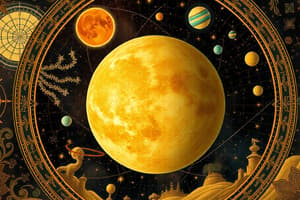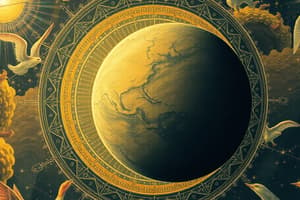Podcast
Questions and Answers
Which planet has a highly elliptical orbit and is closest to the Sun?
Which planet has a highly elliptical orbit and is closest to the Sun?
- Mars
- Earth
- Mercury (correct)
- Venus
Which gas giant planet is known for its prominent ring system?
Which gas giant planet is known for its prominent ring system?
- Jupiter
- Uranus
- Saturn (correct)
- Neptune
Which planet is known for its reddish appearance due to iron oxide?
Which planet is known for its reddish appearance due to iron oxide?
- Earth
- Mars (correct)
- Venus
- Mercury
What is the main reason Pluto is no longer classified as a planet?
What is the main reason Pluto is no longer classified as a planet?
Which planet has the strongest winds in the solar system?
Which planet has the strongest winds in the solar system?
What is a characteristic of terrestrial planets?
What is a characteristic of terrestrial planets?
Flashcards are hidden until you start studying
Study Notes
Planets of the Solar System
Terrestrial Planets
- Small, rocky planets with solid surfaces
- Include:
- Mercury
- Closest to the Sun
- Highly elliptical orbit
- Mars
- Known for reddish appearance due to iron oxide
- Potential for past water and life
- Earth
- Only known planet with life
- Atmosphere supports liquid water
- Venus
- Hottest planet due to thick atmosphere
- Volcanic surface with numerous volcanoes
- Mercury
Jovian Planets
- Large, gas giant planets with no solid surface
- Include:
- Jupiter
- Largest planet in our solar system
- Stormy atmosphere with Great Red Spot
- Saturn
- Known for prominent ring system
- At least 62 moons
- Uranus
- Tilted axis causes extreme seasons
- Thin ring system
- Neptune
- Farthest planet from the Sun
- Strongest winds in the solar system
- Jupiter
Other Planets
- Dwarf planets:
- Pluto
- Formerly considered a planet
- Now classified as a dwarf planet
- Eris
- Located in the Kuiper Belt
- Slightly larger than Pluto
- Pluto
Note: The definition of a planet was redefined in 2006 by the International Astronomical Union (IAU), resulting in the reclassification of Pluto as a dwarf planet.
Planets of the Solar System
Terrestrial Planets
- Characterized by small size, rocky composition, and solid surfaces
- Four terrestrial planets in our solar system: Mercury, Mars, Earth, and Venus
Mercury
- Closest planet to the Sun
- Highly elliptical orbit
Mars
- Known for reddish appearance due to iron oxide
- Potential for past water and life on the planet
Earth
- Only known planet with life
- Atmosphere supports liquid water
Venus
- Hottest planet due to thick atmosphere
- Volcanic surface with numerous volcanoes
Jovian Planets
- Characterized by large size, gas giant composition, and no solid surface
- Four jovian planets in our solar system: Jupiter, Saturn, Uranus, and Neptune
Jupiter
- Largest planet in our solar system
- Stormy atmosphere with the Great Red Spot
Saturn
- Known for prominent ring system
- At least 62 moons
Uranus
- Tilted axis causes extreme seasons
- Thin ring system
Neptune
- Farthest planet from the Sun
- Strongest winds in the solar system
Dwarf Planets
- Pluto: formerly considered a planet, now classified as a dwarf planet
- Eris: located in the Kuiper Belt, slightly larger than Pluto
- Note: Pluto's reclassification as a dwarf planet in 2006 was due to the International Astronomical Union's (IAU) redefinition of a planet.
Studying That Suits You
Use AI to generate personalized quizzes and flashcards to suit your learning preferences.



